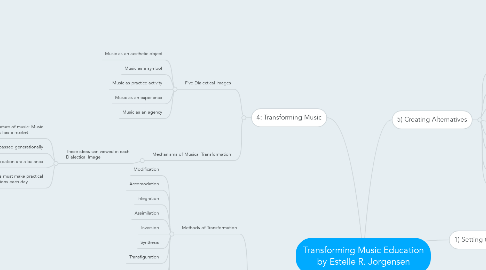
1. 3.Transforming Education
1.1. Methods of Transformation
1.1.1. Modification
1.1.2. Accomodation
1.1.3. Integration
1.1.4. Assimilation
1.1.5. Inversion
1.1.6. Synthesis
1.1.7. Transfiguration
1.1.8. Conversion
1.1.9. Renewal
1.2. Each transformation image is insightful but flawed
1.3. Transformation must have a dialectical view
1.3.1. Metamorphic and Incremental
1.3.2. Systemic and particular
1.3.3. Individual and collective
1.3.4. Within and without the social system
1.3.5. Dark and bright side
1.4. The Educational system is a practice including
1.4.1. Imagination
1.4.2. Spirituality
1.4.3. Particularity
1.4.4. Embodiment of Music
1.4.5. Fallibility: It leaves room for improvement
1.4.6. Dialogue
1.4.7. Agency: Promoting collective action
1.4.8. Expectations: Creating the idea for potential
2. 4: Transforming Music
2.1. Five Dialectical Images
2.1.1. Music as an aesthetic object
2.1.2. Music as a symbol
2.1.3. Music as practice activity
2.1.4. Music as an experience
2.1.5. Music as an agency
2.2. Mechanisms of Musical Transformation
2.2.1. These ideas can viewed in each Dialectical Image
2.2.1.1. The Nature of music: Music always has a market
2.2.1.2. Music is knowledge passed generationally
2.2.1.3. Practice and Participation are a balance
2.2.1.4. Teachers must make practical implications each day
3. 1) Setting the Stage
3.1. The view of music has changed to incorporate an expected visual aspect
3.2. There is an institutional control of education
3.2.1. Leads to difficulty implementing change
3.3. Music education largely remains traditional
3.4. There are cultural problems
3.4.1. Teacher demographic doesn't match student
3.4.2. Culture needs to be at the heart of education
3.5. Teachers mix learning methods
3.5.1. Even if the theories are contradictory
3.5.2. Leads to shortsightedness in problems
3.5.3. To satisfy current problems quickly
4. 2) Justifying Transformation
4.1. Education is carried on by the generations
4.1.1. Needs transformation to survive
4.2. Created problems afflict the wider society
4.2.1. Sexism
4.2.1.1. Views of art change with feminine/masculine perspectives
4.2.2. World view
4.2.2.1. Industrial age is transferring to computer age
4.2.3. Music is inseparable from culture and social context
4.2.4. Traditions
4.2.4.1. Change and innovation is exciting
4.2.4.2. Change makes the previous model obsolete
4.2.5. Mind-Set
4.2.5.1. The reality is there are many negative world events
4.2.5.2. Education is a utopian affair and hopeful experience
4.3. 1990: Standards were set for arts education
4.3.1. It was assumed everyone would adjust
4.3.2. However there are multiple structures of music
